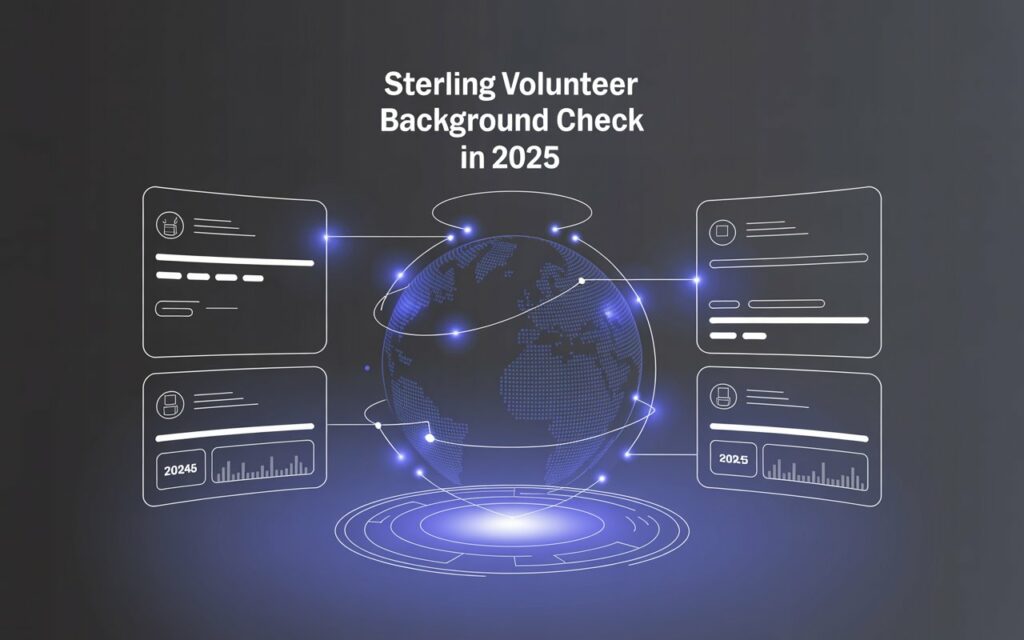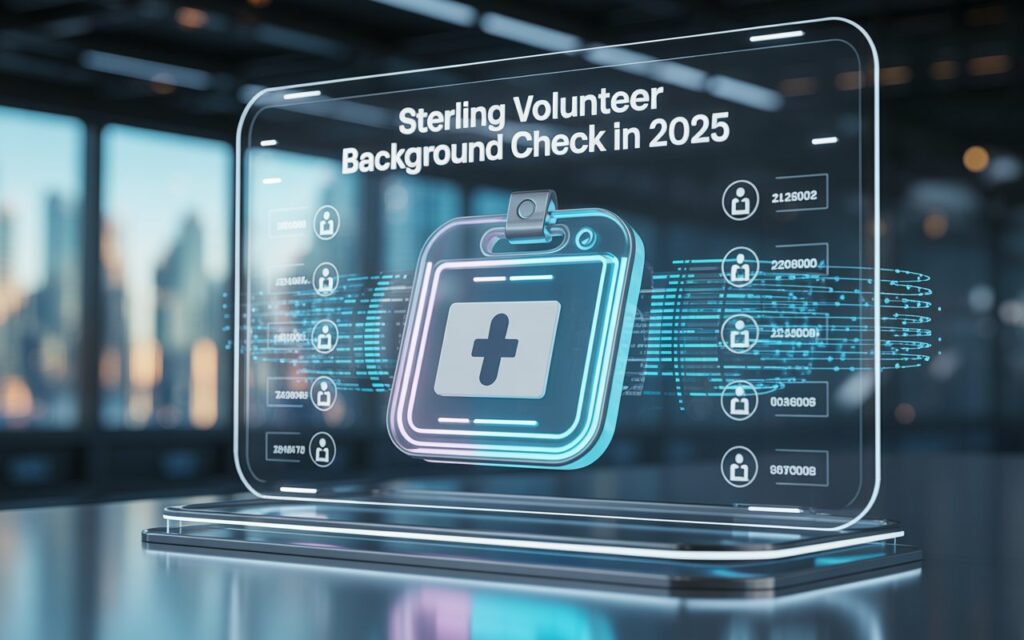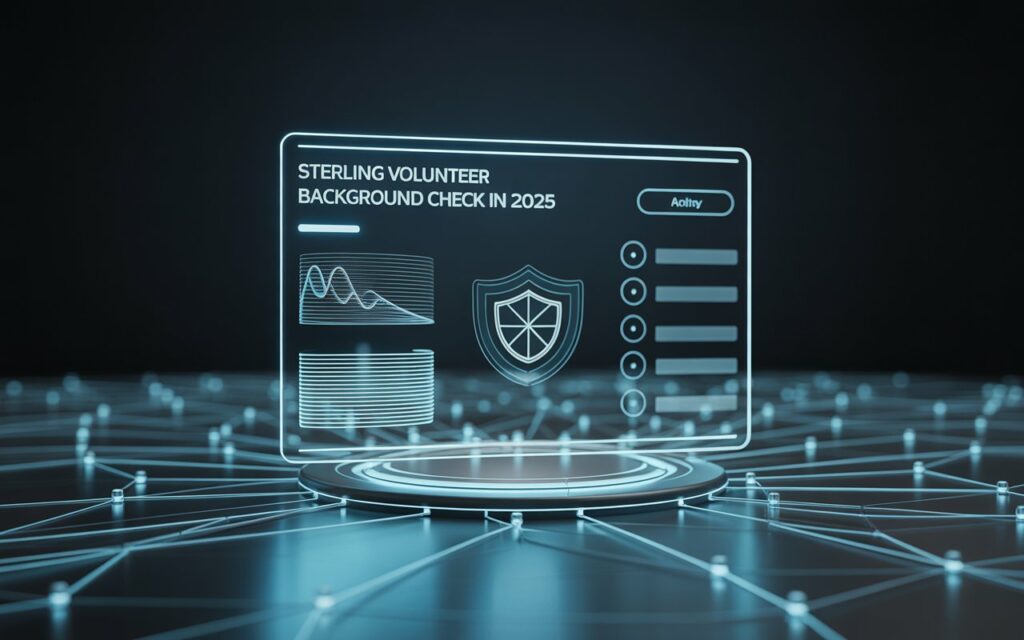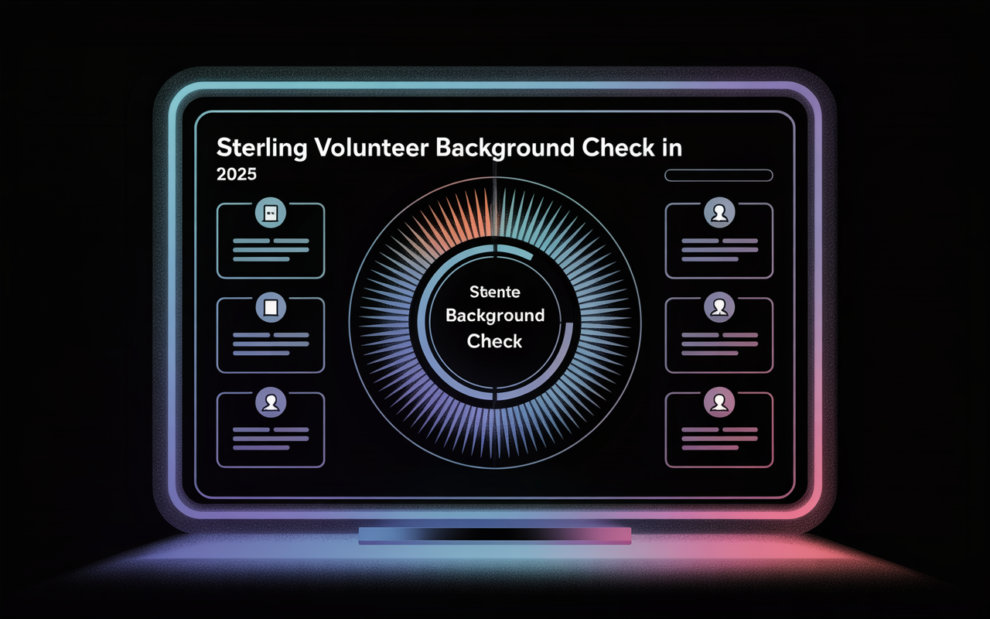Sterling Volunteer Background Check in 2025: The Gold Standard for Safer, Smarter Community Servic
Table of Contents
As community service and civic engagement continue to rise in 2025, background checks for volunteers have become essential in maintaining safe and trustworthy environments. Whether it’s mentoring children, serving in hospitals, or assisting with church programs, volunteers often engage with vulnerable populations. To ensure safety, many organizations rely on the Sterling Volunteer Background Check, a tailored solution that streamlines the screening process while maintaining compliance with modern laws.
This guide provides a complete overview of the Sterling Volunteer Background Check in 2025, exploring its purpose, components, legal requirements, challenges, and best practices for success.
What Is the Sterling Volunteer Background Check?
The Sterling Volunteer Background Check is a customized background screening solution offered by Sterling, one of the leading background check providers globally. This tool is designed for nonprofits, churches, schools, and other organizations that work primarily with unpaid volunteers.
Purpose
- Ensure safety and trust in volunteer roles
- Prevent abuse, theft, and misconduct
- Comply with insurance, funding, and legal regulations
- Protect organizational reputation and liability
What Does the Sterling Volunteer Background Check Include in 2025?
Sterling’s volunteer-specific checks offer comprehensive and customizable screening components:
- Identity Verification
Confirms SSN, names, aliases, and address history - Criminal History Search
Searches county, state, federal, and national databases
Reviews felony and misdemeanor convictions
Includes sex offender registry checks - Global Watchlist Search
Screens against OFAC, Interpol, and other restricted-party lists - Motor Vehicle Records (MVR)
For volunteers who drive as part of their role
Reviews license validity, DUIs, violations - Education or Credential Checks (role-specific)
Verifies diplomas, certifications, and institutions - Social Media Screening (optional)
Flags hate speech, harassment, threats, or extremist behavior - Ongoing Monitoring (if enabled by the organization)
Alerts the organization about new offenses after the volunteer is cleared
The Importance of a Sterling Volunteer Background Check

In 2025, background checks are essential safeguards—not optional formalities. As the volunteer sector grows more diverse and digitally connected, Sterling Volunteer background checks serve as a foundational tool for trust, safety, and organizational accountability. Here’s why they matter more than ever:
- Protecting Vulnerable Populations
Many volunteer roles involve working directly with children, the elderly, individuals with disabilities, or at-risk populations. A comprehensive background check ensures that individuals with a history of violent or exploitative behavior are identified before placing anyone at risk. - Mitigating Organizational Risk
Nonprofits can face significant legal and reputational damage if an incident occurs involving an unscreened volunteer. Sterling’s checks reduce the risk of lawsuits, PR scandals, or insurance complications by verifying that each volunteer meets safety standards. - Boosting Public Trust
Donors, community partners, and the general public want assurance that organizations maintain high standards for those representing them. A reliable background check communicates professionalism and care. - Reassuring Donors and Sponsors
With increased scrutiny around how funds are used and who represents a cause, volunteer vetting reassures stakeholders that their investment is in ethical, trustworthy hands. - Keeping Up With Laws and Digital Risks
Evolving regulations such as AI-in-hiring laws and Clean Slate policies require more nuanced and lawful screening. Sterling’s solutions adapt to this legal landscape while ensuring data security and fairness.
How to Navigate the Sterling Volunteer Background Check Process
The Sterling Volunteer screening process in 2025 is streamlined for ease but remains thorough. Here’s what volunteers can expect:
- Consent and Application
Volunteers begin by completing an online form and digitally signing a consent agreement, as required by the Fair Credit Reporting Act (FCRA). This grants Sterling permission to access personal background data. - Document Submission
Required documents include your Social Security Number (SSN), a valid form of identification (driver’s license, passport, or state ID), and in some cases, licenses or credentials relevant to your volunteer role. - Real-Time Processing
Sterling employs AI and automated data systems to verify information rapidly. It accesses databases like the National Criminal Database, sex offender registries, and county courthouse records. - Results Notification
If anything is flagged in your report, you’ll receive a pre-adverse action notice (as mandated by FCRA). This gives you the chance to review and dispute findings before any final decision is made. - Re-Screening (If Applicable)
For ongoing roles—especially those with higher risk or responsibility—annual or biannual rechecks may be required. Sterling makes this seamless with stored profiles and optional continuous monitoring.
Common Misconceptions About Background Checks for Volunteers

Despite the prevalence of screenings, misunderstandings still exist. Here are the top myths debunked:
- Myth 1: Only Criminals Are Screened
Fact: All volunteers, regardless of background, are screened as a preventive safety measure—not as a judgment. - Myth 2: One Mistake Means Disqualification
Fact: Most organizations do not use blanket bans. They weigh each case individually, considering time elapsed, rehabilitation, and relevance to the role. - Myth 3: Background Checks Are Invasive
Fact: Sterling only collects job-relevant information and complies with data privacy laws, meaning your personal life is not unnecessarily scrutinized. - Myth 4: All Checks Are the Same
Fact: Background checks vary by organization, state laws, and the volunteer role. Sterling customizes its process to align with each nonprofit’s specific needs and jurisdiction.
Ensuring Compliance: Legal Aspects of Volunteer Background Checks
Staying compliant with federal and state laws is essential for protecting both the organization and the volunteer. Here’s what applies in 2025:
1. Fair Credit Reporting Act (FCRA)
- Requires written consent before conducting any background check.
- Volunteers must be provided with the report and be notified before any adverse action.
- Volunteers have the right to dispute inaccuracies and provide explanations or corrections.
2. EEOC Guidelines
- Background check results must be evaluated individually to prevent discrimination.
- Blanket rejections based on race, gender, disability, or arrest records (without conviction) violate these rules.
3. Ban-the-Box and Clean Slate Laws
- Ban-the-box laws prohibit asking about criminal records on initial applications.
- Clean Slate laws in states like Pennsylvania, California, and Utah automatically seal minor convictions after a certain time period, ensuring rehabilitation is honored.
4. AI Transparency Requirements
- If Sterling uses automated systems or artificial intelligence to screen data, volunteers must be notified.
- Volunteers have the right to request human review if AI-generated decisions impact them negatively.
Best Practices for Utilizing Background Checks to Enhance Volunteer Safety

Sterling Volunteer doesn’t just provide checks—it empowers organizations to build trust and protect their mission. Here are the top practices for success:
1. Customize the Screening Scope
Screen only for what matters. If the role involves driving, check motor vehicle records. For child-related duties, run a comprehensive criminal and sex offender background check.
2. Use Continuous Monitoring
Sterling’s monitoring tools alert organizations if a volunteer is arrested or convicted during their service term. This reduces ongoing risk and helps organizations act swiftly if needed.
3. Educate and Inform Volunteers
Explain the purpose of the screening process clearly. Volunteers who understand the process are more likely to comply and feel respected—not judged.
4. Follow Legal Protocols Diligently
Ensure pre-adverse action notices are issued correctly. Allow time for volunteers to respond or correct any inaccuracies.
5. Secure Volunteer Data
Use Sterling’s encrypted platforms and limit access to reports to designated compliance or HR staff only. Data privacy must be treated with the same seriousness as background safety.
FAQs About Sterling Volunteer Background Checks in 2025
1. What is included in a Sterling Volunteer background check?
A Sterling Volunteer background check in 2025 includes identity verification, criminal record checks (local, state, and federal), sex offender registry search, motor vehicle records (if applicable), global watchlist searches, and education or credential verification if needed. Some organizations may also request social media screening or ongoing monitoring for high-risk roles.
2. How long does a Sterling Volunteer background check take?
Most background checks through Sterling are completed within 24 to 72 hours. However, checks that involve county-level court searches or international verification may take longer, depending on the response times of those jurisdictions.
3. Can I be disqualified from volunteering because of a past criminal record?
Not necessarily. Many organizations follow Fair Chance Hiring and evaluate each case individually. They consider the type of offense, how long ago it occurred, and its relevance to the volunteer role. A past criminal record may not automatically disqualify you unless it directly impacts the safety or integrity of the program.
4. Is my personal information safe during the background check?
Yes. Sterling uses industry-leading encryption and privacy protocols to protect your data. All checks are conducted under FCRA compliance, meaning your information cannot be shared or misused without your knowledge and consent.
Conclusion
The Sterling Volunteer Background Check in 2025 has become a cornerstone of responsible volunteer management. With expanded tools, legal safeguards, and customizable screening, Sterling helps nonprofits ensure safety without turning away qualified candidates unnecessarily.
Whether you’re a volunteer preparing to serve, or an organization looking to build a safer program, understanding and navigating Sterling’s background check process is essential to success.
Do Follow Dragcast on Social Media For More Such Content.












Add Comment